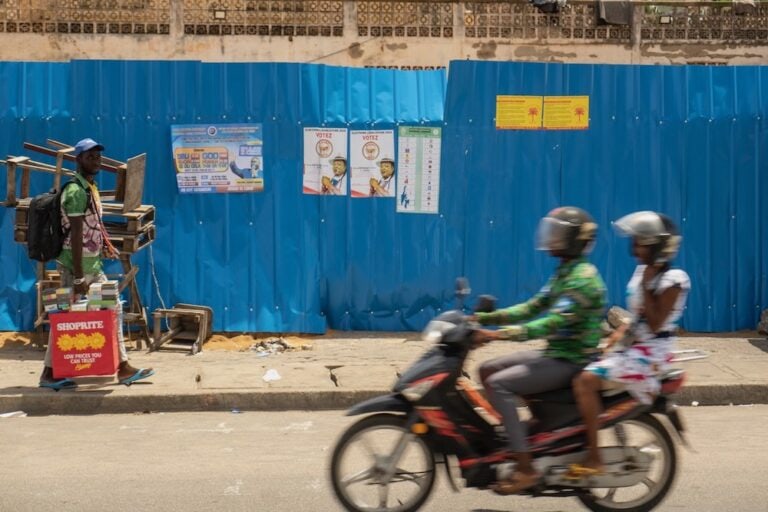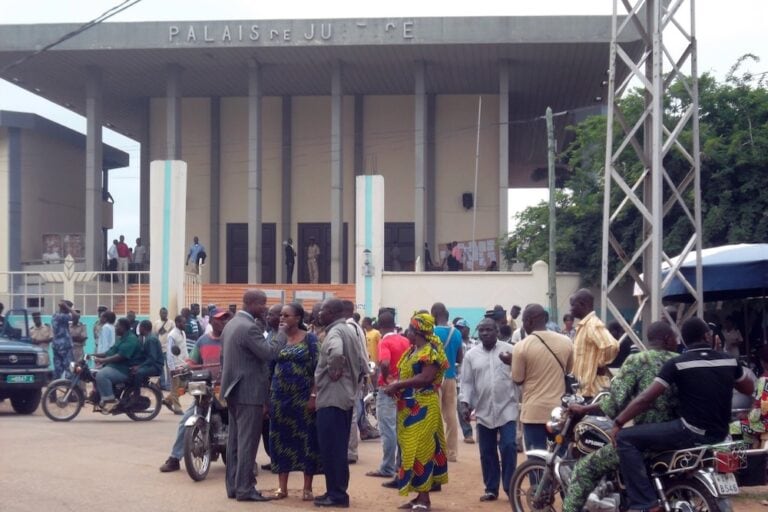(IPI/IFEX) – In a 3 July 2001 letter to Togolese President Gnassingbe Eyadema, IPI expressed its profound concern over the decision of the Togolese authorities to seize the print-run of an opposition newspaper. According to information provided to IPI, on 2 July, a group of armed men, some of whom were dressed in military uniform, […]
(IPI/IFEX) – In a 3 July 2001 letter to Togolese President Gnassingbe Eyadema, IPI expressed its profound concern over the decision of the Togolese authorities to seize the print-run of an opposition newspaper.
According to information provided to IPI, on 2 July, a group of armed men, some of whom were dressed in military uniform, entered the print works of the opposition weekly “Le Combat du Peuple” (People’s Combat) and seized printing plates and printed pages of the newspaper.
Responding to criticism over the raid, Togo’s interior minister, General Sizing Walla, told Reuters that the seizure had been ordered because the newspaper was about to publish “texts of such a nature as would threaten public order.” The interior minister went on to say that the article in “Le Combat du Peuple” alleged that the authorities had deliberately jailed an individual for expressing an intention to kill a former minister, Harry Octavianus Olympio, who is currently in prison after the seizure of explosives at his home and party headquarters.
Over the last twelve months, there have been a number of assaults on the newspaper. On 5 June, Lucien Messan, editorial director of “Le Combat du Peuple”, was given an eighteen-month sentence, six months of which was suspended, for expressing “falsehood and the use of falsehood”. The sentence was awarded by the court for publishing statements on Togo’s human rights’ record (see IFEX alerts of 8, 7 and 1 June 2001). On 17 July 2000, thousands of copies of the newspaper were seized from wholesalers and distributors (see IFEX alert of 19 July 2000). Further copies of the newspaper, along with copies of “Le Scorpion”, were seized on 31 July, when the newspapers sought to publish a report by the Togolese League of Human Rights (see IFEX alert of 1 August 2000).
Concerning the government accusations made against “Le Combat du Peuple”, IPI notes that these involve public order (“ordre public”), which is often used in international covenants as an exception to the right to freedom of expression. However, such an exception may only be used in very narrow circumstances and must be provided by law and be necessary. Furthermore, in order for the exception to be proved, it must be strictly proportional to the specific interest that is being pursued and must not unduly burden the right that is being excepted. In the opinion of IPI, such an exception should only be used as a last resort and where there is a real likelihood or “clear and present danger” that a breach of public order will occur.
In relation to the present case, IPI views the use of public order offences to be outside international standards on exceptions to freedom of expression. The article on a suspected plot to murder a politician was a valid and newsworthy article, well within the bounds of normal investigative journalism. Public order offences are not self-justifying. The government cannot merely announce a public order offence as a means of justifying its actions. There must be clear evidence that a breach of public order is likely to occur. So far, the statements from the government have provided no indication that this is true in the present case.
Recommended Action
Send appeals to the president:
– noting that the use of public order offences is an unwarranted suppression of a newspaper’s right to report freely on events occurring in Togo
– reminding His Excellency that Article 26 of the Togolese constitution, enacted in September 1992, expressly guarantees freedom of expression and states that the “press shall not be subject to pre-publication authorisation or warnings or other restrictions”
– recalling that Togo is a party to the International Covenant on Civil and Political Rights, which states, under article 19, “everyone has the freedom to seek, receive and impart information and ideas of all kinds”
– recalling that Togo is also a party to the African Charter of People’s and Human Rights which sets out similar rights
– urging His Excellency to desist from using public order offences as a means of silencing the media
– calling on the government of Togo to instigate a public review of all laws in the country that infringe freedom of expression and freedom of the press and ensure that they are brought into line with Togo’s international commitments
– noting that by doing so, he will be guaranteeing freedom of expression and the press in Togo
Appeals To
H.E. President Gnassingbe Eyadema
Présidence de la République
Résidence Lomé II
Lomé, Togo
Fax: + 228 21 18 97Please copy appeals to the source if possible.


